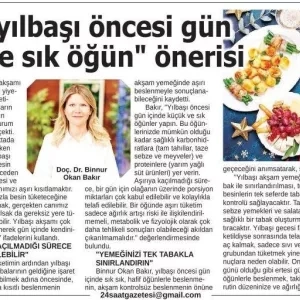Don't Condition Yourself to Overeat on New Year's Eve 10 Steps for New Year's Eve Nutrition Advice

Those on a strict diet may set it aside on New Year's Eve to join the celebrations and partake in the plentiful tables. Plans often include overindulging on the night, followed by resorting to crash diets and detoxes to compensate for the holiday indulgence. Experts advise, first and foremost, against conditioning ourselves to overeat on New Year's Eve and also recommend avoiding post-holiday crash diets and detoxes.
Assoc. Prof. Dr. Binnur Okan Bakır, Head of the Department of Nutrition and Dietetics at Yeditepe University Faculty of Health Sciences, has issued warnings about New Year's nutrition and the subsequent crash diets and detoxes.
Here are 10 points on New Year's nutrition:
-
A day of excess consumption can be compensated: Social, cultural, and psychological factors play significant roles in our dietary intake. Having higher-than-usual amounts of food and drink on special occasions like New Year's Eve is customary. As long as it is not excessive, consuming larger portions for one day is acceptable and can easily be compensated for.
-
Don't condition yourself: First, remind yourself that New Year's Eve is an evening to spend time with loved ones, not a night to eat uncontrollably. Don't precondition your mind to overeat on New Year's Eve. Preconditioning ourselves to consume excessive food on the night can lead to unnecessary consumption, even if we are not truly hungry or already full.
-
Don't starve yourself: One of the most important things to avoid is excessively restricting our food intake before and after New Year's Eve in anticipation of overeating on the night itself. Don't starve yourself during the day, thinking you will eat a lot in the evening. Eating too little throughout the day can lead to overeating at dinner.
-
Have small and frequent meals: On the day before New Year's Eve, have small and frequent meals. Include as much healthy carbohydrates (whole grains, fresh vegetables and fruits) and proteins (low-fat dairy products) as possible in these meals.
-
Stick to one plate: Limiting your New Year's Eve dinner to one plate by taking all the food you intend to eat at once will help maintain control. Filling half of the plate with vegetable dishes and salads will make it easier to create a healthy plate. Eating directly from the serving dishes can lead to consuming too much food unconsciously.
-
Avoid detoxes the next day: If you overeat on New Year's Eve, compensating by fasting, consuming only liquids, or eating from just one food group the following day can lead to unwanted consequences. Don't starve yourself the day after New Year's, and avoid crash diets or detoxes. Instead, continue with light and frequent meals like New Year's Day, which will help you return to your routine and weight in the following days.
-
Drink water: The day after New Year's, drink plenty of water and avoid high sugar and salt intake.
-
Reduce portion sizes: After New Year's dinner, you can reduce the portion sizes in your regular meals but do not skip meals. Instead of compensatory behaviors, continue with your usual routine.
-
There can be unwanted consequences: Remember that eating more than usual for just one evening won't significantly impact your body weight, but overindulgence can lead to sudden and unwanted health problems.
10. It can affect your entire life: In the long term, behaviors such as eating very little before or after New Year's dinner or engaging in restrictive diets or detoxes under the guise of 'shock diets' can be classified as restrictive/compensatory behaviors. These behaviors can trigger eating disorders that may affect you throughout your life.

